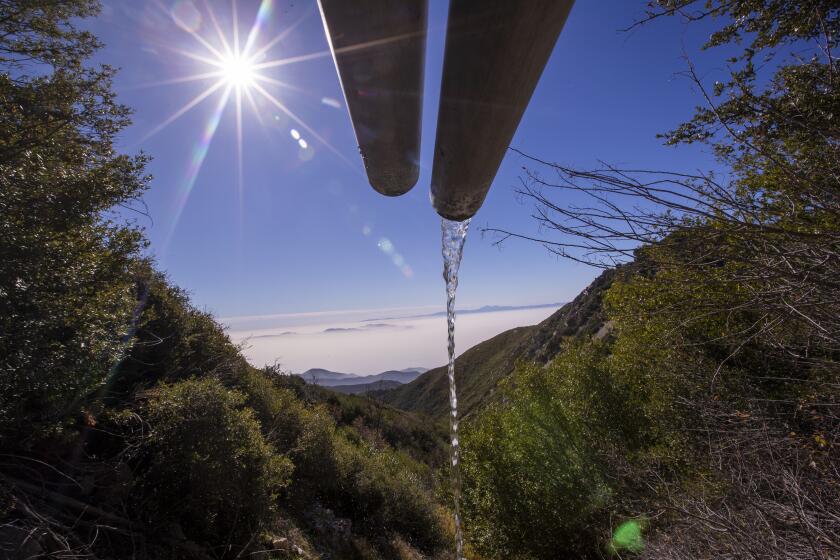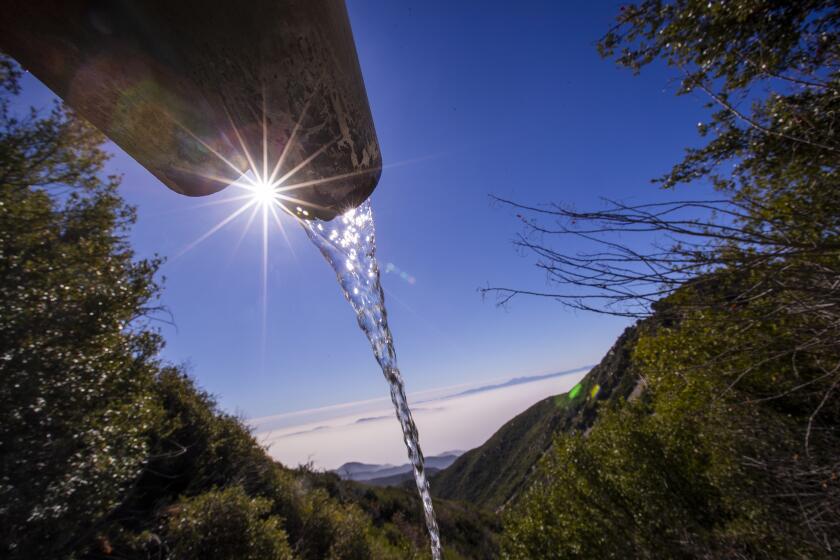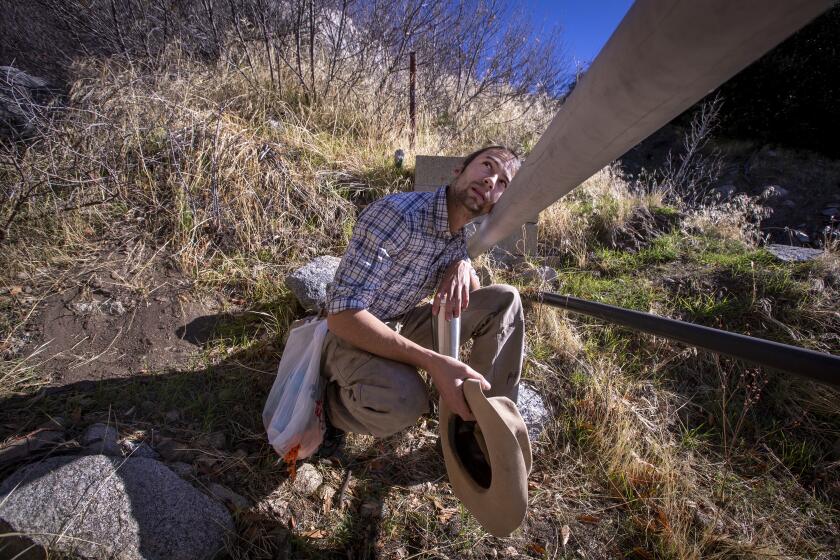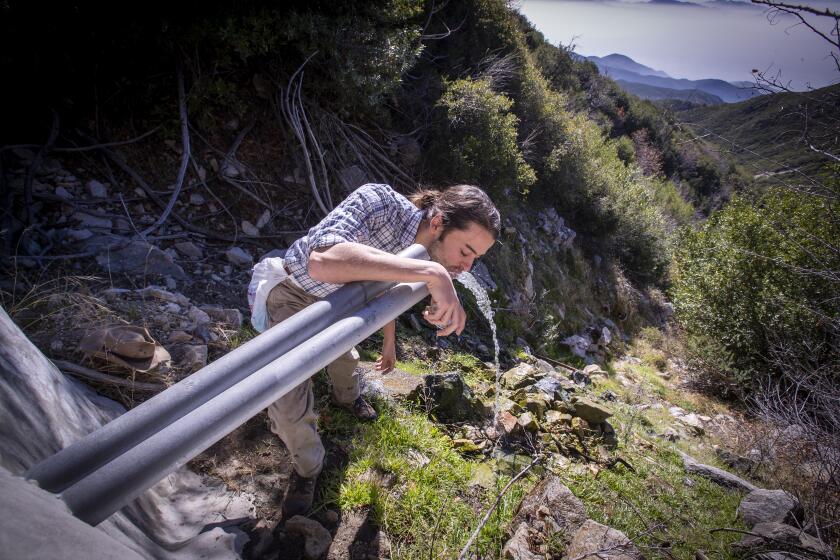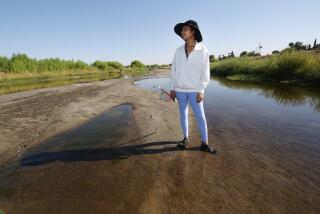California environmental group sues U.S. Forest Service over Arrowhead bottled water operation
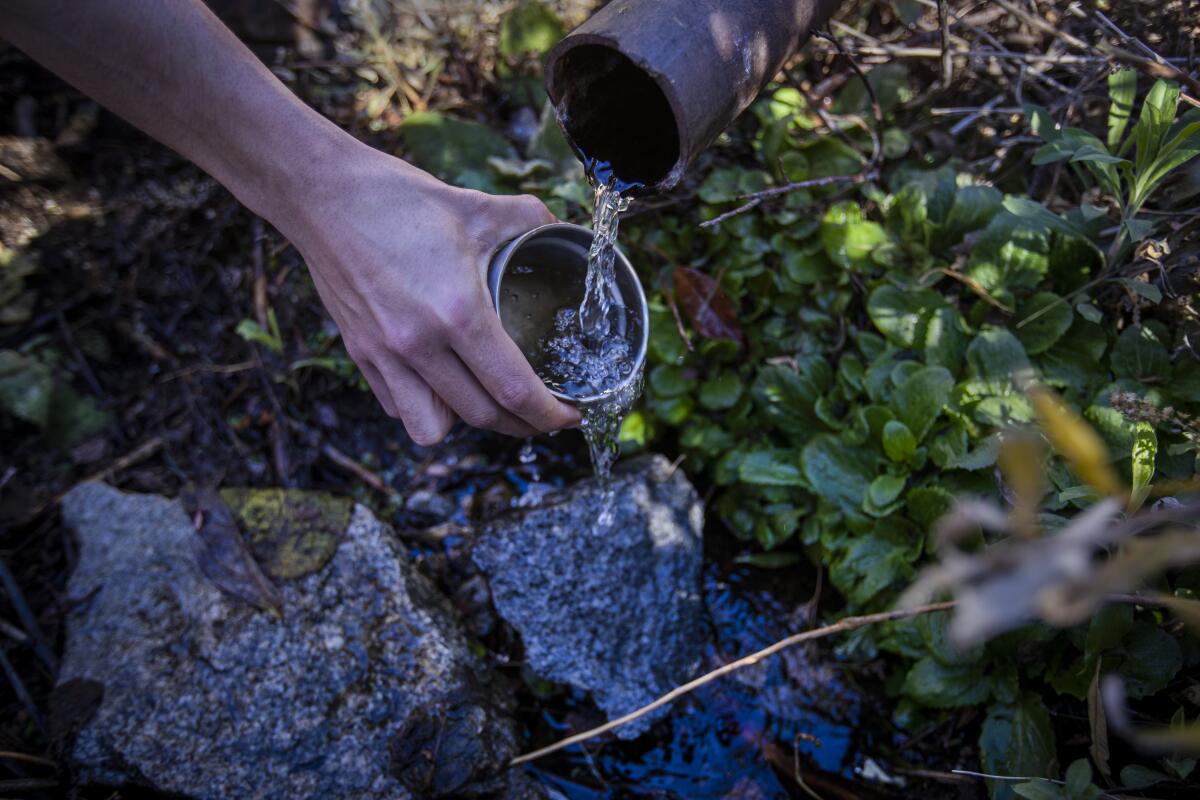
- Share via
A Southern California environmental group is suing the U.S. Forest Service for allowing bottled water company BlueTriton Brands to pipe water out of the San Bernardino National Forest.
The nonprofit group Save Our Forest Assn. filed the lawsuit in federal court, arguing the Forest Service violated federal laws by allowing the company to continue piping water from boreholes and water tunnels in the San Bernardino Mountains.
The environmental group said the extraction of water, which is bottled and sold as Arrowhead 100% Mountain Spring Water, has dramatically reduced the flow of Strawberry Creek and is causing significant environmental harm.
The group said the Forest Service has granted the company “illegal occupancy” of public lands, and urged the U.S. District Court to order the agency to shut down the network of pipelines and remove the water-diverting infrastructure from the national forest.
“The U.S. Forest Service must be accountable for protecting our natural resources,” said Hugh Bialecki, president of Save Our Forest Assn.
Aggressive and impactful reporting on climate change, the environment, health and science.
The lawsuit is the latest of several attempts by activists to stop the use of spring water from the mountains north of San Bernardino.
After a lengthy investigation, state water regulators determined last year that the company has been unlawfully diverting much of the water without valid water rights. The State Water Resources Control Board voted to order the company to halt its “unauthorized diversions” of water from springs in the national forest. But BlueTriton Brands sued to challenge that decision, arguing the process was rife with problems and that the company is entitled to the water.
With the state’s order delayed by that lawsuit, Bialecki and other activists decided to challenge the Forest Service decision to allow the company to continue operating on national forest land over the last five years.
The agency said it does not comment on pending litigation, and that officials are currently reviewing the company’s most recent permit application.
BlueTriton Brands is not named as a defendant in the case.
The company said in an email that the lawsuit “does not have merit, and merely repackages arguments that advocacy groups have unsuccessfully argued in prior legal proceedings.” BlueTriton “will continue to operate in compliance with all state and federal laws,” the company said.
California regulators have ordered the company that sells Arrowhead bottled water to stop taking much of the water it pipes from a national forest.
Environmental activists have campaigned for years for state and federal authorities to shut down the pipeline after a 2015 investigation by the Desert Sun revealed the Forest Service was allowing Nestlé to continue siphoning water using a permit that listed 1988 as the expiration date.
The Forest Service subsequently began a review of Nestlé’s permit, and in 2018 granted a new permit. The revelations about Nestlé piping water out of the national forest sparked an outpouring of opposition and prompted several complaints to California regulators questioning the company’s water rights claims, which led to the state’s investigation.
BlueTriton Brands took over the bottled water business in 2021 when Nestlé’s North American bottled water division was purchased by the private equity firm One Rock Capital Partners and the investment firm Metropoulos & Co. (This month, BlueTriton and Primo Water Corp. announced plans to merge and form a new company.)
BlueTriton and prior owners of the business have for years had a federal “special use” permit allowing them to use the pipeline and other water infrastructure in the San Bernardino National Forest.
The Forest Service has been charging an annual land use fee, currently $2,500 per year. There has been no fee for the water.
When the agency issued the permit in 2018, it was for a three-year term with two optional years. The permit expired in August 2023, said Gustavo Bahena, a spokesperson for the San Bernardino National Forest.
The forest staff “is in the review process for their most recent application,” Bahena said in an email.
“Because BlueTriton had a timely request for renewal of the permit, the current permit remains in effect by operation of law under the Administrative Procedures Act until the forest renders a decision on their new request,” Bahena said. “BlueTriton’s operations in the forest are governed by its permit, and all terms and conditions of the permit remain in full force and effect.”
A company is siphoning water from a national forest to sell as bottled water. California water regulators want to limit the operation.
In the lawsuit, Save Our Forest Assn. argues that when the Forest Service granted the 2018 permit, it violated several laws — including the Federal Lands Policy Management Act, the National Forest Management Act, the Administrative Procedure Act and the National Environmental Policy Act.
The group asked the court to nullify the agency’s most recent permit decision, and to bar officials from allowing water diversions until they carry out a new environmental review. They urged the court to order the Forest Service to remove, or require the company to remove, the water diversion structures and pipes, and restore the area in Strawberry Canyon to its natural state.
Steve Loe, a retired biologist who previously worked for the San Bernardino National Forest, said officials have known for decades that the taking of water has harmed the ecosystem.
“This is the public’s land and water, not a corporation’s that is using it for their profit at the public’s expense,” Loe said.
The lawsuit says the Forest Service has been illegally allowing BlueTriton to continue operating without a “valid” permit.
The company disagreed, saying BlueTriton’s “current special use permit authorizing its operations in Strawberry Canyon remains in full force and effect.”
California ordered a bottled water company to stop taking much of the water it pipes from a national forest. BlueTriton Brands is suing to challenge the ruling.
A court previously considered a dispute over Nestlé’s permit when other environmental groups sued in 2015, accusing the Forest Service of violating the law.
A federal judge sided with the Forest Service in 2016, ruling that the existing permit — which listed an expiration date in 1988 — was still valid because in 1987 the company’s predecessor requested a permit renewal and didn’t receive a response. Environmental groups later reached a settlement with the government in that legal fight.
In the new lawsuit, environmentalists cite historical records describing the springs and the creek nearly a century ago. The records include field notes and reports from W.P. Rowe, a civil engineer who surveyed the watershed starting in 1929.
Rowe wrote that Strawberry Creek flowed on the south slope of the San Bernardino Mountains from a “source at a group of springs” and coursed through a canyon filled with “alder, sycamore, dogwood and cedar trees together with ferns and thimble berry bushes.”
State water officials said in a report on their investigation findings that the first facilities to divert water in the Strawberry Creek watershed were built in 1929, and the system expanded over the years as additional boreholes were drilled into the mountainside. The system of 4-inch steel pipes collects water that flows from various sites on the rugged slopes above the creek.
Records show about 319 acre-feet, or 104 million gallons, flowed through the company’s network of pipes in 2023. The pipeline runs to a roadside tank, and some of the water is trucked to a bottling plant.
Bialecki and other members of the environmental group said historical records show that before the water was tapped for bottling, the stream supported a thriving riparian habitat. They said stopping the diversions would help endangered bird species such as the southwestern willow flycatcher and least Bell’s vireo, as well as other species including the mountain yellow-legged frog and southern rubber boa.
The extraction of water has also reduced flows into the groundwater basin at the foot of the mountains, contributing to a local water “deficit,” the group said.
Activists urge California wildlife officials to crack down on Arrowhead bottled water operations in the San Bernardino Mountains, citing harm to wildlife.
BlueTriton has said it’s focused on “responsible and proactive water stewardship.”
“For nearly a decade, in coordination with the U.S. Forest Service, we have engaged expert scientific consultants who have studied the Strawberry Canyon area in an unprecedented level of detail,” the company said, adding that the findings have shown “no material difference between environmental and habitat conditions in the Strawberry Canyon watershed where we operate and the adjacent canyons where we do not operate.”
Opponents of the company disagree, saying in the lawsuit that the pipelines cause “the removal of substantially all of the water” from springs and dry up the creek’s west fork in the summer and fall, “causing significant environmental harm.”
Amanda Frye, an activist who has campaigned for years against the taking of water from the national forest, said she hopes that the lawsuit brings change.
“We’ve tried everything,” she said. “It’s ridiculous because it keeps going on.”
“The forest was founded to protect the watershed,” she said, “and here they’re just allowing it to be destroyed.”
Toward a more sustainable California
Get Boiling Point, our newsletter exploring climate change, energy and the environment, and become part of the conversation — and the solution.
You may occasionally receive promotional content from the Los Angeles Times.

